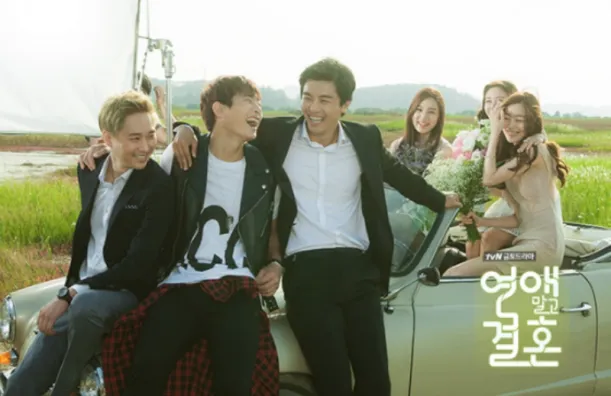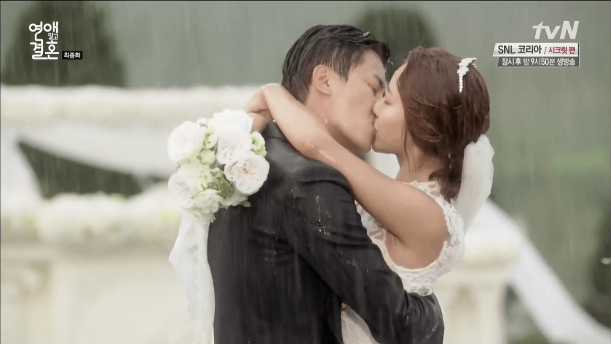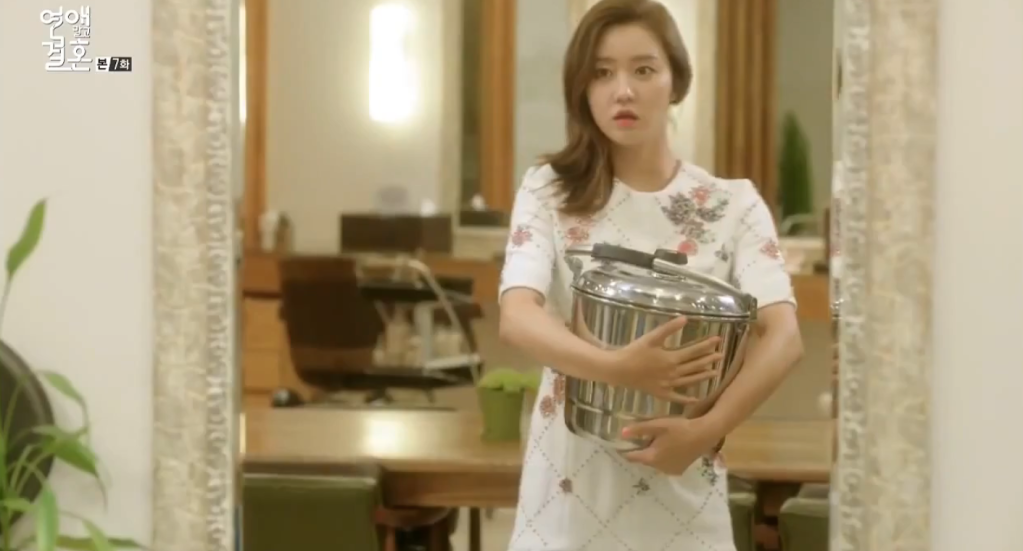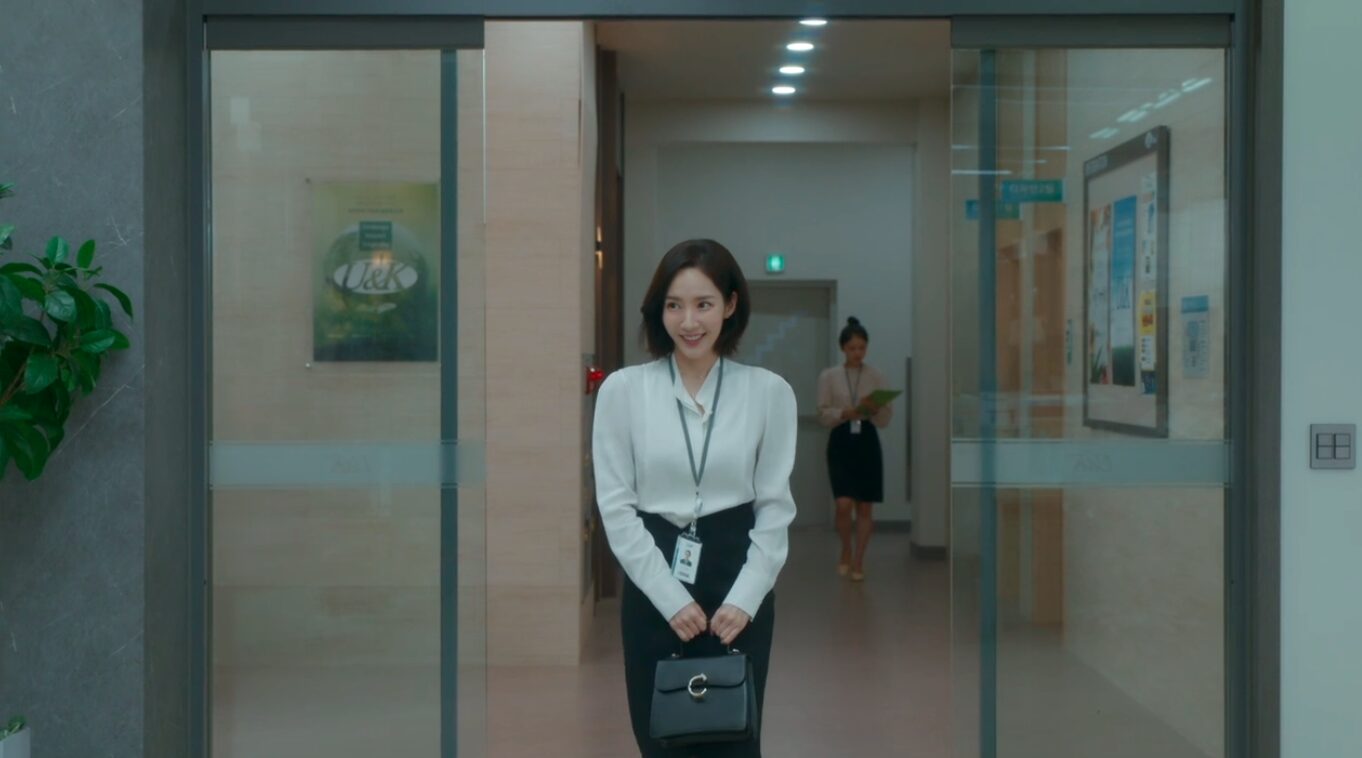
For Pickle
The 2014 romantic comedy, Marriage, Not Dating, remains somewhat polarising. Some love it. Some hate it. Some couldn’t finish it.
Sometimes, I surprise its detractors by revealing that it is my favourite romcom. Well my second favourite romcom. If you count I’m Not a Robot as a romcom. I don’t really count I’m Not a Robot as a romcom. Marriage, Not Dating is my favourite romcom!
This contract romance tells the tale of wealthy plastic surgeon, Gong Gi-tae (Yeon Woo-jin), who asks the trashy Joo Jang-mi (Han Groo) to pretend to be his girlfriend. The assumption is that his upper-class family will never agree to let him marry somebody so common. His goal is to avoid marriage completely.
Gi-tae’s family is all about tradition, ritual and conservatism. Jang-mi’s is a cliche of warm, hardworking, sometimes grasping, poverty. It’s a Candy/Chaebol setup on paper: a rich man/poor woman romance that ends in marriage (possibly). Yet it’s all the ways in which the drama is none of these things that led me to fall in love with it – eventually at least.

Gi-tae is not a Chaebol
There are no company machinations, no board meetings, no Conglomorate-as-Joseon-Kingdom snorefest. Gi-tae’s family is wealthy and has a long, esteemed family history. But they’re no 1%. And so Marriage, not Dating is never bogged down with all that tiresome scheming and chicanery. Well it has chicanery. Just not of the “who will end up with the most shares in the holding company” kind of chicanery. The conflict never arises from who will inherit wealth or competing ideas of how the country company should be run. We’re not fighting over a kingdom of any kind here. Rather, conflict comes from the rigid and restrictive notions of marriage, family and tradition that flow from a conservatism designed to protect privilege.

Jang-mi is no Candy
Jang-mi may be poor, hardworking and optimistic but she’s no smiling, passive martyr waiting for the universe to right itself around her. She’s a big ball of energy who lives her life at 110% and isn’t afraid to wear her heart and, sometimes, her guts on her sleeve. It can make for some uncomfortable scenes and, at least in earlier episodes, some detours into slapstick.
Jang-mi may be the victim of some first-episode injustice, but she never faces it stoically and with the dignity of the deserving poor. She kicks and screams and fights back and her life is frequently messy and often complicated. She has bad relationships and bad dates and even gets charged with being a stalker. But she has a big heart, a huge determination and never once thinks that marriage or a relationship will solve her problems. In fact, carving out her own identity and achieving something for herself is part of her character’s journey.
You never feel as though the plot of the drama is happening to Jang-mi, rather that it is happening with her. She participates in the plot and is a driver of it. In this, her bad decisions are part of what I love about the show. A lot of Candy/Chaebol dramas steer clear of these kinds of consequences by stopping their female lead from making any decisions at all. Jang-mi makes mistakes because she’s constantly in motion and because she genuinely cares and that’s not something you can say about a standard Candy.

The male lead is always mostly nice to the female lead
From almost the drama’s first scene, Gi-tae treats Jang-mi honestly and with consideration. While he believes she can be of use to him, he is also genuinely disgusted at his best friend’s treatment of her and his unthinking participation in it. With a family that is disingenuous, dishonest and insincere, he assumes that all relationships are the same. But it means he appreciates and admires earnestness and honesty; qualities he quickly recognises in Jang-mi. He respects her unflagging sincerity, at least once he realises it’s what motivates her.
Gi-tae is prickly, bad tempered and often outright rude but never to Jang-mi (at least once the first episode settles). In a genre known for male leads mistreating their apparent love interests or treating them with kid gloves like children, it’s refreshing to have a male lead who always treats the female lead as an adult worthy of adult respect. And this extends to not engaging in fake civility or patronising solicitude. Gi-tae grew up in a household of unhappy, passive-aggressive people using civility as a weapon. Jang-mi can take care of herself and is capable of making her own decisions. Gi-tae respects that. And her.
Although, in the interests of honesty, I should change the name of this point to, “The male lead mostly treats the female lead with respect” because, well, Gi-tae is almost never nice to anybody because he sees niceness as insincerity and has a thick wall of armour to keep it out.
Our main couple like each other
Unlike a lot of romcoms, Marriage, Not Dating takes the time to show us Jang-mi and Gi-tae’s relationship. Their real relationship. Not a Hallmark picture-perfect, fade-to-black, kiss-at-the-end relationship. But their growing and deepening connection to each other and how each responds to conflict and the mundanity of daily life.
One advantage of the contract marriage trope, when done correctly, is that it’s a secret shared by the main couple. It brings them together. Most romcoms have a premise of a secret or a lie that stands between the main couple: contract marriage is a secret and a lie that forms a bubble around our OTP binding them together against the world. Before they’re lovers, they’re partners in crime. And friends.


While the show has its requisite share of misunderstandings, misdirects and misapprehensions, Jang-mi and Gi-tae have each other’s backs from very early on. They have fun with each other, talk to each other, enjoy each other’s company, and desire each other. As such, their relationship feels real.
Female martyrdom is critiqued and found wanting
So much of the classic Candy/Chaebol setup centres around Candy’s nobility in the face of injustice. She constantly centres the needs of others before her own and this is seen as a good thing. For women at least. Self-sacrificing women who put their families and friends before themselves are lionised and women who want something for themselves are portrayed regularly as villains.
Marriage Not Dating goes straight to the heart of this trope in classical romances and skewers it. If you’re not happy, you can’t make others happy. If you don’t know yourself, you can’t choose somebody to share your life with.
Jang-mi may be sincere but she’s also so empathetic that she always puts the needs and emotions of others before herself. One episode in the first half chooses to represent this burden literally as she drags around a huge pot of soup her mother wants to give to Gi-tae while catering to the whims of his selfish family.

Before she chooses a man, Jang-mi needs to choose herself. And she’s not the only one. The show’s back half is devoted to this negation of martyrdom, especially for women. Which brings us to the main reason I love the show (apart from loving the OTP of course) and that is….
Blame falls where it’s due
After too many years of watching too many dramas, I can confidently predict that the drama you’re watching right now will let all the male characters off the hook and land on a woman to blame for everything. Usually the evil mother-in-law and/or stepmother. The patriarch of the family will be portrayed as a passive victim of female scheming or will be given a redemption arc that leaves him largely unscathed.
Marriage, Not Dating is one of the few dramas that has the courage to show why the male lead’s mother is the way she is; the product of her own institutionalised mistreatment at the hands of complex family politics, attempting finally to be the bully rather than the bullied. Gi-tae’s mother (played with panache by the inestimable Kim Hae-sook) justifies her own mistreatment and her tolerance of it by enforcing it into the next generation. After all, if her daughter-in-law gets to be different, then what does that say about what she’s endured at the hands of her own mother-in-law?
It’s a rare drama that says that the person who needs to change is the mother-in-law and even rarer one that portrays that change as leading to her own liberation. After all, the biggest villain in these shows is always the patriarch. Marriage, Not Dating is actually willing to say it.

In this, Jang-mi’s greatest romance is arguably not with Gi-tae at all but with his mother, as she slowly, empathetically (but not necessarily gently) dismantles the facade the older woman has built up to survive.
Candy/Chaebol stories are usually tales of how a poor girl tears a tiny hole in the social structure to allow herself in; usually to be bullied unmercilessly for the rest of her life (we presume). Marriage, Not Dating is instead a story of how the force of nature that is Jang-mi smashes it into pieces and grinds those pieces into dust. In this, it may be one of the most revolutionary dramas I’ve ever seen.
Our traditional social structure is flexible enough to allow this much diversity while maintaining fundamentally intact, says even the most radical Korean drama. This whole thing needs to change, says Marriage, Not Dating, while its female characters dance on the shards of their glass house. It’s revolutionarily feminist (at least for a Kdrama) and I am here for it.
The importance of ‘likable’ characters
The main criticism of Marriage, not Dating – and the reason why so many people drop it – is that all the characters from scene one are complex and, at times, unlikable. Gi-tae is a misanthrope, Jang-mi is a mess. Of the second leads, Gi-tae’s ex-fiancee, Kang Se-ah (Han Sun-hwa) comes across as a bored rich girl messing with people for fun, while his best friend and Jang-mi’s ex, Lee Hoon-dong (Heo Jung-min) is a spoiled child throwing his toys out of the cot and then having a tantrum when they’re gone. The second male lead, Han Yeo-reum (Jung Jin-woon), is portrayed as sweet but fundamentally frivolous in contrast to Jang-mi’s persistent sincerity.
It’s possibly not surprising that many people did not like these characters. Although with a well-written drama like Marriage, Not Dating, the scope for character development needs to be considered. And while characters don’t necessarily change, they grow as they form friendships and relationships with each other.

There’s a whole piece begging to be written about why audiences tolerate unlikeable male characters but are unsympathetic to unlikeable female characters. Jang-mi may seem unlikable in the beginning, but we get to know her as Gi-tae gets to know her. It’s not as though she improves but that we, and he, get to understand her better. More importantly, both our leads are on a journey to understand themselves and it’s a journey we get taken on as well.
Things I’m not such a fan of
Slapstick
The show’s physical comedy leaned too far into slapstick at several points, especially in the earlier episodes. Han Groo’s physical skills are excellent and Yeon Woo-jin’s comedic timing is en-point. Nonetheless, the show does sometimes go too far and some viewers were no doubt put off by this early on. In particular, episode 5 uses an extended metaphor about food poisoning and diarrhoea that works surprisingly well but involves a lot of toilet humour too and one wonders if the same message – things sometimes get messy and uncomfortable but you get nowhere by ignoring it – couldn’t have been made without bowel explosions.
The cold opens
Each episode of Marriage, Not Dating opens with a scene from the end and then takes its viewer on a journey towards that scene. In some cases, this is done really well, but in others it’s a deliberate misdirect. Because of its hit and miss nature, it starts to feel like a gimmick, especially in those cases where what we see at the end doesn’t fit with the episode or even changes the cold open completely. Kfangurl accused the show of outright lying with their cold opens and she has a point.
Propping plastic surgery
Gi-tae (and his ex-girlfriend, frenemy, something something) is a plastic surgeon and show takes every chance to hard-sell cosmetic surgery as a fun thing that people can totally just do for no reason. South Korea already has one of the higher rates of plastic surgery in the world and Marriage, Not Dating verges on portraying it as the equivalent of a mani-pedi.
Overall
No piece on Marriage, Not Dating would be complete without some thoughts on the show’s portrayal of relationships, grounded as they are in the binary of the show’s title. Marriage – a traditional institution between families that regularly has little to do with the feelings of the people involved – and dating, which is often seen as playing around with people you like.
Jang-mi gets into trouble from the first scene because, for her, these two distinctions don’t exist. She is sincere in all she does and the idea that somebody could spend an entire year with her without serious intentions is quite unthinkable for her. And yet, on the other side of the tracks, loveless partnerships, secret affairs and arranged marriages for the benefits of the family are commonplace. Dating is messing around, marriage is serious business.
Marriage, Not Dating does a good job of exploring this binary, while also coming down strongly on the benefits of spending time alone to get to know yourself before you try to couple up.
While no show is for everyone, for me Marriage, Not Dating was fresh, unconventional and subverted both the Candy/Chaebol drama it ostensibly was as well as the contract marriage trope. On rewatch, the show’s writing is just as strong and our two main leads are enormously fun to watch.

It’s a love story where I truly believed and rooted for the OTP but one also where character journeys of people I thought would be minor characters – like Gi-tae’s mother – were profound. I love almost everything about where this show landed and in this respect it truly is a comedy. It started poorly and ended well.
The defence rests.
Marriage Not Dating is available to stream on Viki, but not in Australia




I am currently sloooowly watching the show with a friend and I am really enjoying the show. Somehow there were many things I could not make sense of, until you pointed them out in this post. I might not be a force to be reckoned with, but I offer any assistance you might need to defend this gem. 😉 Lovely piece LT, take care. Love, Turtie.
Excellent defence! I enjoyed reading the piece. Thank you for writing this – and, no surprises – I enjoyed reading this way more than I enjoyed (whatever little I watched of) the drama itself. I think I tried till ep10… Does your post mean I will try picking up MnD where I left off? Nope. I think we must choose to sadly hold divergent views on INAR and MnD. We’ll find common ground elsewhere, like FoS haha.
How on earth did I miss this? An excellent defense of a wildly misunderstood and underrated drama.
Crush the patriarchy and kick it out of the house like the trash it is.